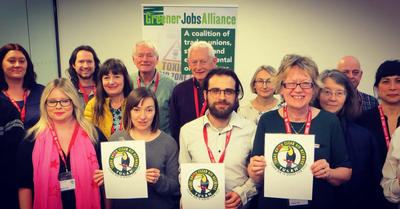Trade Union Clean Air Network (TUCAN) was launched on Wednesday 6 February 2019
Air Pollution - all in a day's work?

On Wednesday 6 February 2019, the Trade Union Clean Air Network (TUCAN)¹ was launched. The event took place at the Head Office of the International Transport Workers (ITF) in London. It was attended by a wide range of trades unions and supporting organisations including Client Earth, British Lung Foundation and the London Sustainability Exchange. The meeting discussed the Trade Union Clean Air Network Charter that has been drawn up to promote a trade union voice on this public health emergency.
In the same week UNICEF launched a Healthy Air for every Child Report³ that criticised the UK Government policy for being 'insufficiently ambitious and won't protect children's health.' Graham Petersen, GJA Secretary, commented"There has rightly been a public outcry about this but very little has been said about workers as a vulnerable group. The fact is there are huge numbers of people who are exposed to dangerous levels of pollutants as a result of work. Indoor and outdoor pollution affects people at work and travelling to and from work and yet this is rarely reflected in national and local strategies"
The Charter calls for new legal protections and occupational standards to give greater protection to workers. TUCAN will be organising events and training sessions to press the case for recognising this occupational health emergency.
Date: 8/2/19
Enquiries: Graham Petersen: email: gjacoms@gmail.com
The clean air charter says:
Trade Union Clean Air Network Charter
Trade Unions need a response to what has been described as a public health
emergency. Over 40,000 people die each year in the UK where the air that they breathe is a
major contributory factor. A significant cause is pollution arising from work and travel to work.
It is an occupational health issue that employers take little responsibility for. There is very little
recognition of this in national and local authority strategies. This charter provides a framework
for unions to campaign for the health and environmental concerns of workers.
1. New Clean Air Act - We support legislation that enshrines the right to breathe clean air
into domestic law. It should set new, more stringent legal limits for ambient air quality,
which reflect WHO guidelines. There should be a recognition within it of air pollution as
an occupational health issue but with the impact felt from birth, with air pollution stunting
the growth of babies and children.
2. Establish a new Environmental Protection Agency - The legislation needs to be backed
up by a watchdog body that has the teeth to take public bodies and employers to court.
In relation to membership there should be places allocated to representatives of the
trade union movement.
3. Update Health and Safety Law - The COSHH Regulations should be updated to reflect
new research on indoor and outdoor air pollution. Workplace Exposure Limits should
place duties on employers to monitor and adopt control measures for diesel and other
toxic emissions. Risk assessment should include environmental impacts caused by or
related to work, with an obligation to present strategies for minimising and eradicating
pollutants within the workplace and in the wider community.
4. Consult with the workforce - Air quality measures for indoor and outdoor occupational
air pollution must be subject to the consultation requirements of the SRSC Regulations.
They should cover both employees and the needs of vulnerable occupants of buildings,
including in particular children, considered.
5. Skills, Training and information -. Employers should be required to raise awareness and
support workforce training on risks and control measures. Workers may need access to
independent advice on exposure levels.
6. Protecting jobs - Government and employer clean air strategies will have implications
for jobs and employment. The application of Just Transition principles must be adopted
to ensure positive impacts for workers. Full equality impact assessments, including sex,
race and class, must be implemented to ensure positive and fair impacts for workers.
7. Rapid expansion of clean, inexpensive public transport systems - Cleaning up air in the
UK will require significant expenditure. It is crucial that those least able to afford it are
not expected to pick up the bill. Taxation policy must require fossil fuel companies to
subsidise measures for less polluting forms of energy and transport.

